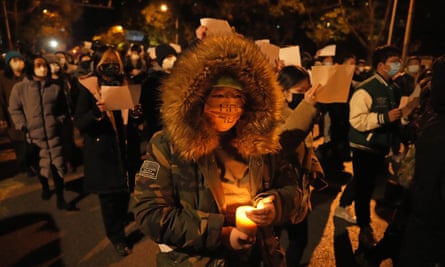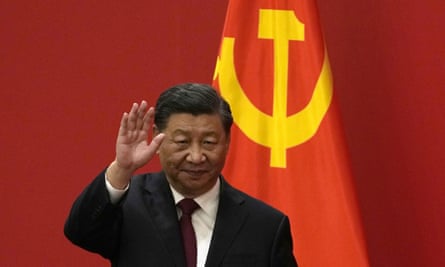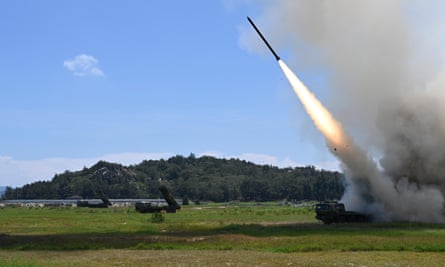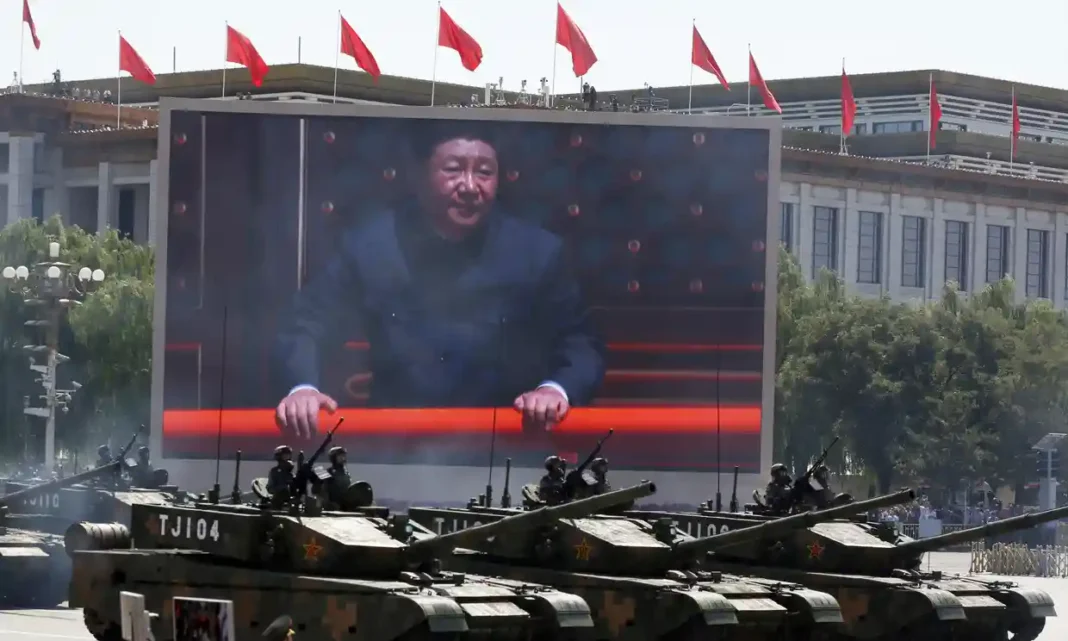As 2022 began, while swaths of the world were struggling with Covid and a looming war in Ukraine, life in China was relatively calm. Xi Jinping’s zero-Covid strategy was working and cases were low. There were lockdowns but they were orderly and people were compliant. This stability was exactly what Xi probably hoped would surround his taking of a historic third term, at the helm of a rising China. Economic dominance, domestic control, an annexed Taiwan, and increased global influence were all on the agenda.
But as the year closes and 2023 begins, China is, instead, entering uncharted territory.
In the last 12 months there have been significant housing and economic issues, the Taiwan strait crisis in August, western sanctions on China’s human rights abuses and US curbs on its burgeoning chips industry, and a messy friendship with Russia. Xi took his third term, but weeks later protests swept the country, featuring astonishingly brave acts of dissent and appearing to herald the abrupt end of the zero-Covid policy.
Politically, 2022 was supposed to be a year of glory for the Chinese president, but instead it “gave Xi much more to worry about than to gloat over”, says the veteran China expert Jerome Cohen. “His country is in turmoil, and he has suffered a lot of damage in the eyes of the masses.”
At the 20th party congress in October, Xi secured a third five-year term, becoming China’s most powerful leader since Mao Zedong. It upended what his predecessors had established specifically to prevent power centralising around an individual. He enshrined “Xi Jinping thought” as the core of the party’s platform, and purged members of a rival faction, symbolised by the bizarre removal of the faction’s leader, the former president Hu Jintao, from the Congress hall.
Xi’s now unchecked political power has provoked fears over what decisions he may make while surrounded by yes-people.
“Xi securing a third term is, in my view, the biggest thing for China in 2022,” says Prof Steve Tsang, director of the Soas China Institute. “Xi may think that he has a good chart (Xi Jinping Thought) to guide China moving forward, but he is effectively taking China into uncharted territory.”
The most alarming of Xi’s plans is to annex Taiwan, but analysts do not foresee any attempt to take it in the near future. The past year had a record-breaking increase in Chinese military activity towards the self-ruled democracy. In August, the Xi era’s first white paper on Taiwan reiterated the Chinese Communist party’s (CCP) willingness to use force to take the island. A visit by the US House speaker, Nancy Pelosi, to Taipei gave Beijing cause to demonstrate its force, escalating already aggressive military harassment to record levels.

The US is a key player in cross-strait relations and has increased its support for Taiwan with signals about giving it “non-major Nato ally” status, and big defence spending bills to sell it weapons. Ma Chun-Wei, of Tamkang University in Taiwan, says China cannot really counter the US so instead directs reaction at Taiwan and its 23.5 million people.
Cognitive and cyberwarfare and acts of economic coercion are expected to increase before Taiwan’s next presidential elections in early 2024. “China will dial up its coercive actions against Taiwan … as long as the [independence-leaning] Democratic Progressive party is in power, there is little question,” says Yun Sun, director of the China Program at the Washington-based Stimson Center thinktank.
On Monday, Taiwan reported 71 Chinese air force aircraft including fighter jets and drones had entered the island’s air defence identification zone over the previous 24 hours, the largest reported incursion to date.
The CCP’s moves on Taiwan have been a key reason for Xi’s plummeting relationship with the west. The party’s continued persecution of dissenters in Hong Kong and abuses in Xinjiang – which the UN’s human rights chief declared in August may amount to crimes against humanity – have also increased the division.
Relations were further strained by Russia’s invasion of Ukraine just weeks after Xi and Vladimir Putin announced a “limitless” friendship, and which Beijing refused to condemn.
The invasion caused a political headache for Xi and has left him in a complicated spot on the world stage for as long as the war continues. He has had to balance his alliance with Putin, his wish to avoid getting caught up in anti-Russia sanctions, and the ongoing China-Russia rivalry for soft power – and trade routes – in central Asia.
US officials said in March that Putin had asked China for weapons support. Beijing did not answer the call but has provided help in other ways, including apparent cooperation on propaganda and disinformation campaigns, and lobbying against western sanctions. Chinese officials have offered explicit approval of the invasion, and the two countries’ armies recently conducted joint military drills.
Meanwhile, brawling diplomats have also not helped Xi’s relationship with the west. In December, China’s consul general in Manchester, England, and five other diplomats were sent home by Beijing and escaped questioning by UK police for their role in beating up a pro-Hong Kong democracy protester outside the consulate in the city in October.
But global relationships still matter to Xi. After he inked his third term he hit the global meeting ground running, talking to dozens of heads of states, including Joe Biden. Cohen says Xi is trying to improve his government’s image “after too many strident and provocative policies”.
Xi’s overtures will test the global community, which had taken a tougher stance on China’s human rights this year, says Maya Wang, the associate director of Human Rights Watch’s Asia division. “I worry that, after these kinds of outreach, many governments, for example Germany, would soften their approach to China, pushing human rights from the fore to the back burner, once again,” she says.

For now, government stances remain tough, and the US is pushing ahead with measures, including sanctions on China’s semiconductor industry, which Japan and the Netherlands are expected to join, causing trouble for Xi’s plans to get the faltering Chinese economy back on track.
Soas’s Tsang says these measures “may have longer and wider impact [than Covid] on the economy of China in 2023”.
Zero-Covid restrictions and the near collapse of the property development sector punished China’s economy this year. To address the property collapse, the CCP has allocated 1.4tn yuan (£166bn) to restarting construction projects, which Trivium analysts believe “will allow developers to start ramping up construction” and boost China’s economy.
But the government will still be reckoning with the economic fallout of zero-Covid and the coming waves of outbreaks now the policy has gone.
A faltering economy could further provoke domestic frustrations, which peaked in 2022 over the impact of Xi’s signature hardline zero-Covid policy. For two years China ran the strategy that allowed most people to live a largely normal life, and kept deaths low. But then the highly transmissible Omicron overwhelmed the policy, wreaking economic and social chaos.

As people lost tolerance with rampant sudden and badly run lockdowns, sporadic protests broke out that were further inflamed by a string of fatal tragedies, including a quarantine bus crash and a building fire in locked-down Xinjiang.
What became the most significant protests in China since 1989 were mostly against the deprivations of Covid-zero, but censorship complaints and anti-Xi sentiment also featured.
The protests awakened some Chinese to the government’s treatment of their minority and dissident compatriots. “The pandemic fiasco has increased popular awareness of the party’s lack of respect for the laws and regulations it has promulgated, despite its great efforts to establish a ‘rule by law’ regime,” Cohen says.
Authorities launched a swift police response to shut down dissent, but the protests seemed to have had an effect: within a week, the zero-Covid system that many thought would be in place for many more months, if not years, was abruptly dismantled.
With no more lockdowns, quarantine, travel restrictions or mass testing, Covid cases have soared across China. Mass fatalities are predicted, with estimates of up to a million people dying from the virus.
On Monday, in his first remarks on Covid since the shift in policy, Xi urged officials to take steps to “feasibly protect people’s lives” and said: “We should launch the patriotic health campaign in a more targeted way … fortify a community line of defence for epidemic prevention and control, and feasibly protect people’s lives, safety and health.”
Trivium says what happens next with Covid and Covid policy is “the most important question” politically and economically, for China and Xi in 2023: “It’s not at all clear how this plays out.”
The past year has brought far more for China than Xi would have hoped, or analysts expected.
Tsang says that, in the end, events have still largely worked out for Xi, even if protests took the shine off his leadership. “He mostly got what he wanted, including not just a third term as top leader but also a leadership filled by his supporters,” says Tsang. “It is less clear that it was equally good for China, as Xi’s amassing of near dictatorial power is costing China dearly.”
Additional reporting by Chi Hui Lin
theguardian

